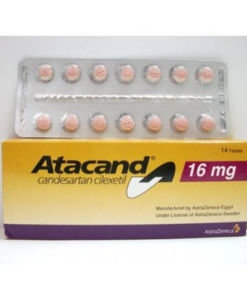DOGMATIL 50 MG 30 CAP
40.50 EGP
In stock
* For psychosomatic symptoms.
* Therapeutic indications:
– This medication is indicated for the treatment of certain forms of anxiety in adults and the treatment of certain behavioral disorders in adults and children over age of 6 years.
– also used for irritable bowel disease, GIT motility disorders, nausea & vomiting & peptic ulceration.
* Dosage:
– In psychosomatic components of organic diseases: 100-200 mg/day.
In negative (deficit) symptoms: 200-600 mg/day.
In positive (productive) symtoms: 800-1600 mg/day.
* Contraindications:
Hypersensitivity to the active ingredient or to other ingredients of the drug.
Concomitant prolactin-dependent tumors eg pituitary gland prolactinomas and breast cancer.
Pheochromocytoma.
Association with levodopa.
* Special warnings and special precautions for use:
– As with other neuroleptics, Neuroleptic Malignant Syndrome, a potentially fatal complication, which is characterized by hyperthermia, muscle rigidity and autonomic dysfunction may occur.
In case of hyperthermia or undiagnosed originm sulpiride should be discontinued. When neuroleptic treatment is absolutely necessary in a patient with Parkinson’s disease, sulpiride can ne used, although this has not been evaluated with sulpiride. Therefore patients with a history of epilepsy should be closely monitored during sulpiride therapy.
– In case of renal insufficiency, the dose should be decreased.
– In elderly patients, as with other neuroleptics, sulpiride should be used with particular caution.
– In children, efficacy and safety of sulpiride has not been thoroughly investigated. Therefore, caution should be exercised when prescribing to children.
– In patients with aggressive behavior or agitation with impulsiveness, sulpiride could be given with a sedative.
Prolongation of the QT interval: Sulpiride may induce a prolongation of the QT interval. This effect, known to potentiate the risk of serious ventricular arrhythmias such as torsade de pointes is enhanced by the pre-existence of bradycardia, hypokalemia, congenital or acquired long QT internval.
Before any administration, and if possible according to the patient’s clinical status, it is recommended to monitor factors which could favor the occurrence of this rhythm disorder.
. bradycardia less than 55 bpm,
. hypokalemia,
. congenital prolongation of the QT interval,
. On-going treatment with a medication likely to produce pronounced bradycardia (<55 bpm), hypokalemia, decreased intracardiac conduction, or prolongation of the QTc interval.
* Pregnancy and lactation:
– The use of sulpiride is not recommended during pregnancy because of the limited experience.
– Sulpiride has been found in milk in treated women. Therefore, breast-feeding is not recommended during treatment.
* Swallow capsule whole, not chewed, with sufficient amount of water.
* Store below 25 degrees C.




